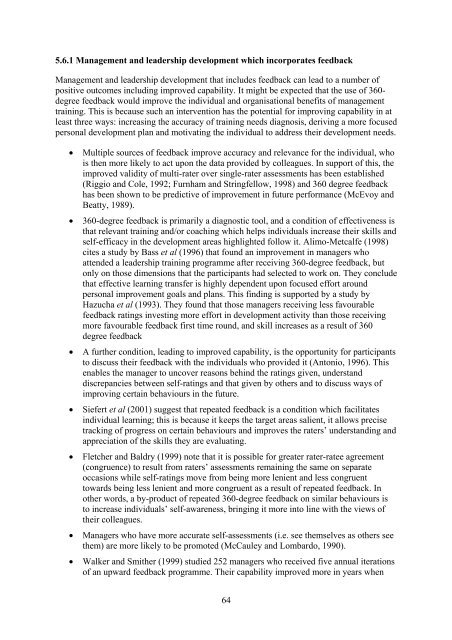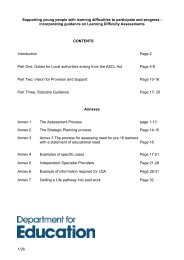The Development of Management and Leadership Capability and its ...
The Development of Management and Leadership Capability and its ...
The Development of Management and Leadership Capability and its ...
You also want an ePaper? Increase the reach of your titles
YUMPU automatically turns print PDFs into web optimized ePapers that Google loves.
5.6.1 <strong>Management</strong> <strong>and</strong> leadership development which incorporates feedback<br />
<strong>Management</strong> <strong>and</strong> leadership development that includes feedback can lead to a number <strong>of</strong><br />
positive outcomes including improved capability. It might be expected that the use <strong>of</strong> 360degree<br />
feedback would improve the individual <strong>and</strong> organisational benef<strong>its</strong> <strong>of</strong> management<br />
training. This is because such an intervention has the potential for improving capability in at<br />
least three ways: increasing the accuracy <strong>of</strong> training needs diagnosis, deriving a more focused<br />
personal development plan <strong>and</strong> motivating the individual to address their development needs.<br />
• Multiple sources <strong>of</strong> feedback improve accuracy <strong>and</strong> relevance for the individual, who<br />
is then more likely to act upon the data provided by colleagues. In support <strong>of</strong> this, the<br />
improved validity <strong>of</strong> multi-rater over single-rater assessments has been established<br />
(Riggio <strong>and</strong> Cole, 1992; Furnham <strong>and</strong> Stringfellow, 1998) <strong>and</strong> 360 degree feedback<br />
has been shown to be predictive <strong>of</strong> improvement in future performance (McEvoy <strong>and</strong><br />
Beatty, 1989).<br />
• 360-degree feedback is primarily a diagnostic tool, <strong>and</strong> a condition <strong>of</strong> effectiveness is<br />
that relevant training <strong>and</strong>/or coaching which helps individuals increase their skills <strong>and</strong><br />
self-efficacy in the development areas highlighted follow it. Alimo-Metcalfe (1998)<br />
cites a study by Bass et al (1996) that found an improvement in managers who<br />
attended a leadership training programme after receiving 360-degree feedback, but<br />
only on those dimensions that the participants had selected to work on. <strong>The</strong>y conclude<br />
that effective learning transfer is highly dependent upon focused effort around<br />
personal improvement goals <strong>and</strong> plans. This finding is supported by a study by<br />
Hazucha et al (1993). <strong>The</strong>y found that those managers receiving less favourable<br />
feedback ratings investing more effort in development activity than those receiving<br />
more favourable feedback first time round, <strong>and</strong> skill increases as a result <strong>of</strong> 360<br />
degree feedback<br />
• A further condition, leading to improved capability, is the opportunity for participants<br />
to discuss their feedback with the individuals who provided it (Antonio, 1996). This<br />
enables the manager to uncover reasons behind the ratings given, underst<strong>and</strong><br />
discrepancies between self-ratings <strong>and</strong> that given by others <strong>and</strong> to discuss ways <strong>of</strong><br />
improving certain behaviours in the future.<br />
• Siefert et al (2001) suggest that repeated feedback is a condition which facilitates<br />
individual learning; this is because it keeps the target areas salient, it allows precise<br />
tracking <strong>of</strong> progress on certain behaviours <strong>and</strong> improves the raters’ underst<strong>and</strong>ing <strong>and</strong><br />
appreciation <strong>of</strong> the skills they are evaluating.<br />
• Fletcher <strong>and</strong> Baldry (1999) note that it is possible for greater rater-ratee agreement<br />
(congruence) to result from raters’ assessments remaining the same on separate<br />
occasions while self-ratings move from being more lenient <strong>and</strong> less congruent<br />
towards being less lenient <strong>and</strong> more congruent as a result <strong>of</strong> repeated feedback. In<br />
other words, a by-product <strong>of</strong> repeated 360-degree feedback on similar behaviours is<br />
to increase individuals’ self-awareness, bringing it more into line with the views <strong>of</strong><br />
their colleagues.<br />
• Managers who have more accurate self-assessments (i.e. see themselves as others see<br />
them) are more likely to be promoted (McCauley <strong>and</strong> Lombardo, 1990).<br />
• Walker <strong>and</strong> Smither (1999) studied 252 managers who received five annual iterations<br />
<strong>of</strong> an upward feedback programme. <strong>The</strong>ir capability improved more in years when<br />
64
















